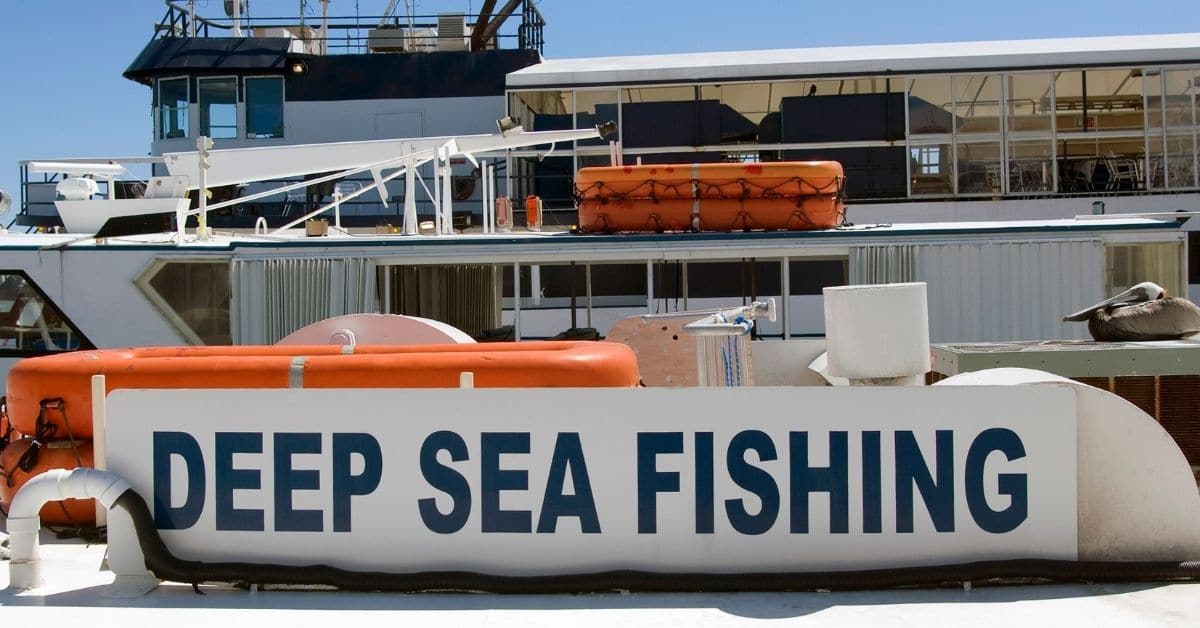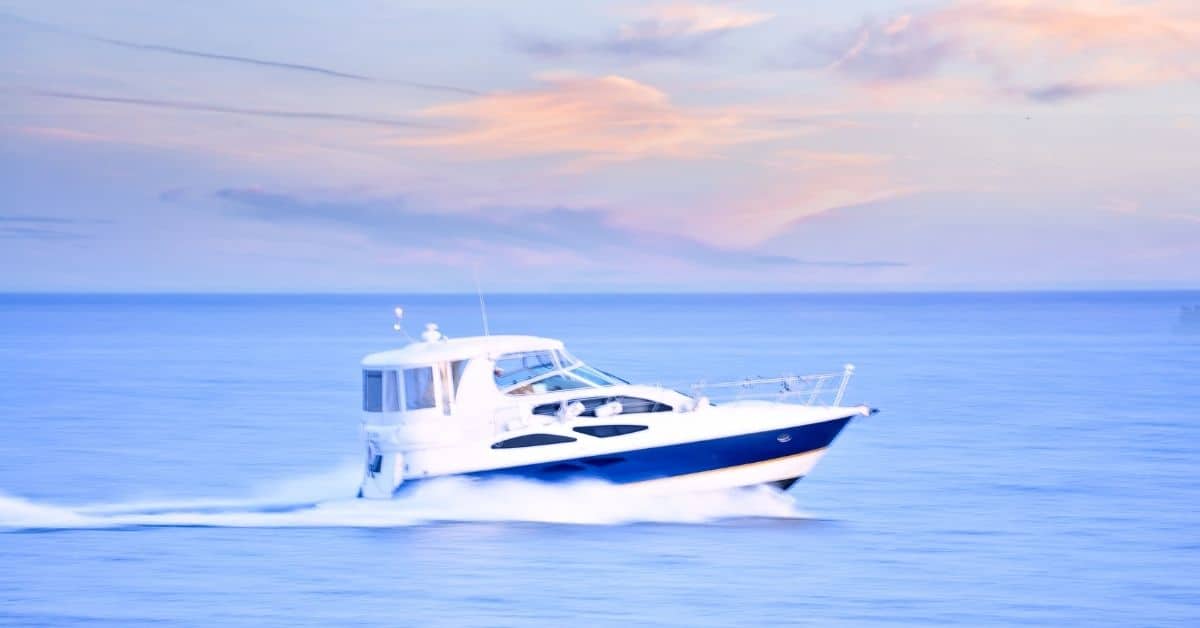Sailors using smacks in the nineteenth century faced huge casualties at sea. Fortunately, this was reduced with the introduction of steam trawlers, but up to date, many anglers fear deep-sea fishing, which begs the question, “is deep sea fishing dangerous?” Well, after thorough research, this is what we found out.
Generally, deep-sea fishing is not necessarily dangerous. But anything that includes unpredictable weather, sharp knives, hooks, boats, unpredictable weather, and water possess some form of risk.
Some of the common risks associated with deep-sea fishing are dehydration and sunburns.
Deep-sea fishing possesses many risks, including falling overboard and the boat sinking due to the high tides. So in this article, we’ll try and answer the question, “is deep sea fishing dangerous?”. We’ll also show you why deep-sea fishing can make you sick.
Is Deep-Sea Fishing Dangerous?

If you love adventure and are reading this article, then the chances are that you’ve thought about trying deep sea fishing. The idea of fishing in the open seas, far from civilization, with only your skills to help you catch something, can seem interesting, but you are still wondering, is deep sea fishing dangerous?
Deep-sea fishing can be someone’s worst nightmare; after all, hundreds of thousands of anglers have lost their lives while deep sea fishing in the past.
Unfortunately, deep-sea fishing isn’t one of the safest jobs in the world. After all, there are many safety risks associated with being hundreds of miles away from the shores. Over one-third of the world’s deep-sea anglers are injured every year.
Deep-sea fishers have a high likelihood of losing their lives than workers in other industries. But they still love what they do and always keep going for as long as they can.
Deep-sea fishing takes place between 5 to 150 miles from the shores. And since these fishing trips take many days, the anglers are usually exposed to many hazardous situations. So, yes, deep-sea fishing is dangerous, and some of the dangers associated with this activity include:
- Exposure To Sharp Fishing Gear

Deep-sea fishing is associated with huge species; therefore, you need bigger hooks and leaders to catch them. And one of the most dangerous boats in the deep sea fishing sector is the swordboat that goes after swordfish.
Swordfish are huge powerful species that are captured using huge hooks that are big as our hands. Plus, there are over 1,000 hooks in the boat that have to be sharpened before being cast.
The crew members have to sharpen these hooks using grinding wheels or files, which can be very dangerous, especially with the high tides. Exposure to such huge fishing hooks is one of the main reasons this job has a huge casualty rate.
- Harsh Weather Conditions
Another answer to the question “is deep sea fishing dangerous?” is the harsh weather conditions. Other than fighting the huge tides that make fishing in deep-sea fishing quite challenging, you also have to deal with the ever-changing weather conditions.
And in case of a storm, then your boat or ship may be exposed to real danger, especially with the cold and strong wind. In fact, in the past, lots of vessels were lost during harsh weather conditions.
The British government announced the loss of four vessels between 1957 and 1966 due to harsh weather conditions. The cause of this loss was the ice formed on the water’s surface by freezing spray, which affected the stability of most vessels that capsized in the sea.
It occurs when low temperature combines with strong wind, and they are quite common in winter. The unpredictable weather condition is the leading cause of the high casualty rate in the industry.
Even though most deep-sea anglers wear sunscreen, they are vulnerable to the ever-changing weather conditions. After all, most of them can’t find shelter quickly enough when it starts raining or high waves rock the boat. But winds, particularly strong wind, can create rough seas. Strong winds can be hazardous when they blow over a long stretch of water upstream.
Storms can make deep sea fishing dangerous by forming huge waves, which can rock the boat out of control when combined with strong winds. And in the extremely worst scenario, the sea’s turbulence can capsize or even flood the boat.
- Falling Overboard
Another reason folks ask if deep sea fishing is dangerous is the high fall overboard fatality. In the deep sea, folks are always dealing with being seasick, harsh weather, and fighting huge fishes; therefore, a huge percentage of them are always at risk of falling overboard.
And as much as the ship is always prepared for such occurrences, this can sometimes lead to fatalities. Poor weather conditions and unsteady boats are the leading causes of folks falling overboard.
In the U.S., the second leading cause of fatalities in the fishing industry is a man overboard. There were 210 fatal falls overboard between 2000 and 2014 in the United States. Unfortunately, most fatalities didn’t have a floatation device, and they died from cold incapacitation and not hypothermia. Cold incapacitation refers to the loss of your ability to coordinate your movements when fishing.
Will Deep-Sea Fishing Get You Sick?

Deep-sea fishing can make some people sick; after all, some of us are seasick while others are not. And the only way to find out if you’re seasick is to go offshore for a deep-sea fishing trip.
But remember, irrespective of how sick you become, the ship won’t turn back; therefore, it’s always a good idea to be prepared.
And if you suffer from motion sickness, then the sea can make you seasick. Like any other form of motion sickness, seasickness occurs when the brain can’t process all the information sent from the body, ears, and eyes. The motion caused by the rocking boat can leave you feeling sick in the stomach or queasy.
Some of the factors that can increase your likelihood of getting motion sickness include:
- Pregnancy
- Migraines
- Menstrual periods
- Parkinson disease
- Inner ear disorders
- Hormonal birth control
- Family history of seasickness
Some of the symptoms of motion sickness include:
- Headache
- Fatigue
- Cold sweats
- Nausea and vomiting
- Increased saliva in your mouth
- Irritability
- Rapid breathing
- Pale skin
Therefore if you have motion sickness, then you must be wondering if deep-sea fishing is dangerous. Well, the rocking of the boat can make you seasick, so you have to be prepared for the trip by carrying either Dramamine or Cyclizine (Marezine).
FAQs
How Many Folks Lose Their Lives While Deep-Sea Fishing?
According to the NIOSH (National Institute for occupational-safety-and-health), about 42 individuals die while deep sea fishing every year. People can lose their lives while deep-sea fishing, but this can be due to inadequate safety measures.
Is Fishing In The Ocean Dangerous?
Fishing is the main reason why the sea wildlife population is dropping at a very high rate. Generally, fishing is not bad, but it becomes a problem when the anglers catch more fish than the stock can replenish. And this has led to some species becoming endangered or extinct.
Is There A Cure For Seasickness?
For some people, motion sickness is hereditary; therefore, curing it can be quite challenging. But you can control it when you go deep-sea fishing using a wide range of antihistamines, including dimenhydrinate and Cyclizine.
Conclusion
Is deep-sea fishing dangerous? Yes, but it all depends on your preparation for the trip. So make sure you find out when the weather will be ideal for deep-sea fishing. And if you follow all the safety procedures given by the ship captain, you will be safe.




Cory Haasnoot
Cory is a content writer-editor and founder of Tackle Box Talk. Favorite Quote: "Give a man a fish, and you feed him for a day. Teach a man to fish, and you feed him for a lifetime."